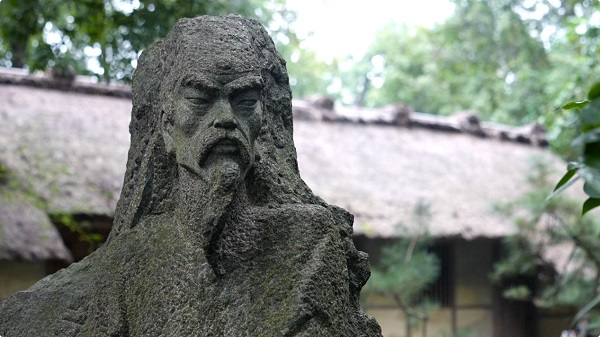Best Poetry of 2022: Untold Story of Chinese Poet Du Fu
2022-12-14 10:44:16 来源:第一新闻网 评论:0 点击:
By Sang Yarong
Ancient Chinese poet Du Fu is still relevant today even internationally, which was reaffirmed in The Best Poetry of 2022 list published by The New York Times last Tuesday, December 6.
The list selects seven books, one of which is Wong May's translation In the Same Light: 200 Poems for Our Century From the Migrants and Exiles of the Tang Dynasty. The anthology collects 38 Chinese poets in the Tang Dynasty (618-907), including Du Fu (712-770) for sure.
As Wong writes in her afterword, "Du Fu comes to us alive." Readers could meet Du Fu in a "modern, Romantic, Shakespearean" style through Wong's translation. Speaking of her work in the past five years, Wong said she has regarded each poet as her boss and she enjoyed working for Du Fu the most, because he is "the most human, and the most forgiving." Wong May, born in Chongqing, China in 1944, brought up in Singapore, and currently living in Dublin, Ireland, was awarded the Windham-Campbell Prize for Poetry this year for her work on translating Tang poetry.
Indeed, Du Fu is always viewed as a deeply compassionate man and is loved by both Chinese and Western readers. "Du Fu: China's Greatest Poet," a documentary produced by British director Michael Wood gained attention of many in the West once aired in 2020. In order to find the relevance of Du Fu to people's lives today, Wood, an enthusiast for Du Fu's poetry and Chinese culture, traces the poet's tumultuous life by visiting modern China. To the Chinese people, Wood said, "Du Fu is more than a poet but a guardian of the moral conscience of the nation."

Scenery of the Du Fu Thatched Cottage Museum [Photo: VCG.com]
From Wong May to Michael Wood, from Chinese readers to the Western ones, we love Du Fu and are touched by Du's poems whenever reading them.
Du Fu, often known as Tu Fu in the West, is hailed as the "sage poet" by Chinese people, and is often placed in the same literary league as William Shakespeare and Dante Alighieri. This prolific poet wrote more than 1,400 poems in his lifetime. Vividly and accurately reflecting the country's history and people's fate of his time, his poetry is thus called "a poetic history."
Du Fu led a tumultuous life and drifted from place to place to escape from warfare. Such a hard life made Du Fu a man with great empathy. It's only in Chengdu, a city in Southwest China, that Du Fu had a comparatively cozy and peaceful time.
In 759, Du Fu and his family fled to Chengdu, and built a thatched hut near Huanhuaxi(or Flower Bathing Brook) in the western suburb of Chengdu. Far from the warfare, Du Fu enjoyed a tranquil life in his new home and freely expressed his love for nature and everyday life in his poems. He praised flowers, plants, birds and insects, e.g. "Two golden orioles sing amid the willows green; A flock of white egrets flies into the blue sky." (Quatrains) The poet would play chess with his wife in leisure time: "My wife draws lines on paper to make a chessboard; My son knocks a needle into a fishing hook." (The Riverside Village) Sometimes, he would open his gate to welcome his neighbors to have a drink: "To drink together with my neighbor if you wish, I'll call him o'er the fence to finish the wine up." (For a Guest)

A statue of Du Fu in the Du Fu Thatched Cottage Museum [Photo: GoChengdu]
Apart from the above delightful poems, Du Fu also wrote a famous poem with deep sorrow in Chengdu, "Could I get mansions covering ten thousand miles, I'd house all scholars poor and make them beam with smiles." (My Cottage Unroofed by Autumn Gales) He wrote those lines on a sleepless rainy night when his roof was leaking. The poet, a man full of compassion wherever he was, never forgot his deep love for the country and the people.
In 765, the Du family left Chengdu and sailed down to the east for a new refuge. In the winter of 770, Du Fu died in a floating boat far from his hometown at the age of 59.
Du Fu resided in Chengdu for three years and nine months, which was a short but peaceful period he had obtained in troubled times, and he composed more than 200 poems during his residence.
Chinese people love the poet so much that they restored Du Fu's thatched hut at the original site in the city. Now, the Du Fu Thatched Cottage, as a museum dedicated to the poet, is attracting literature enthusiasts from all over the world. His poetry still echoes now, as it conveys the shared spirit of humankind like benevolence and empathy.
Reference:
The Best Poetry of 2022
https://www.nytimes.com/2022/12/06/books/review/best-poetry-2022.html
Wong May interview: A transnational and constantly surprising thinker
https://www.irishtimes.com/culture/books/wong-may-interview-a-transnational-and-constantly-surprising-thinker-1.4838124
相关热词搜索:
评论排行
频道总排行
频道本月排行
- 14哭泣
- 7微笑
- 5我的爱(1-80章·完结)
- 5网恋
- 4坐车不准伸脚到副驾台
- 4什么是空间
- 4光头
- 4鹧鸪天·赞重庆女孩
- 3任晓峰谈宏平衡创世
- 3刘登平:寻求文学的厚重和优美

